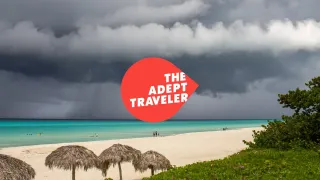Hurricane Safety Tips for Travelers in the Caribbean

Traveling to the Caribbean is a dream vacation for many, with its pristine beaches, clear blue waters, and vibrant culture. However, the tropical paradise can sometimes turn into a dangerous place if a hurricane forms during your stay. Knowing what to do in such a situation is crucial for ensuring your safety and that of your loved ones. This guide will provide you with essential hurricane safety tips for travelers in the Caribbean, helping you stay prepared and informed during your vacation.
Understanding Hurricanes and Their Impact
Hurricanes are powerful tropical storms that can cause significant damage and pose serious threats to safety. When vacationing in the Caribbean, it is essential to be aware of the potential for hurricanes, especially during the hurricane season, which typically runs from June to November. The impact of a hurricane can range from strong winds and heavy rainfall to storm surges and flooding, all of which can disrupt travel plans and endanger lives.
Pre-Travel Preparations
Before embarking on your Caribbean vacation, it's crucial to take certain precautions to ensure your safety in the event of a hurricane. First, always check the weather forecast for your destination and be aware of any potential storm developments. Invest in travel insurance that covers natural disasters, including hurricanes, to protect yourself financially. Additionally, research the hurricane policies of your accommodation and ensure they have an evacuation plan in place.
Monitoring Weather Alerts
Once you are in the Caribbean, staying informed about the weather is vital. Pay attention to local news and weather channels, and consider signing up for weather alerts on your smartphone. Websites and apps like the National Hurricane Center provide real-time updates on tropical storms and hurricanes. Being aware of the latest weather developments will give you ample time to prepare and take necessary actions if a hurricane is imminent.
Creating an Emergency Plan
Having a well-thought-out emergency plan is essential for hurricane preparedness. Identify safe shelters in your vicinity, such as designated hurricane shelters or sturdy buildings that can withstand strong winds. Make a list of essential items you may need, including food, water, medications, important documents, and emergency supplies like flashlights and batteries. Ensure all family members know the plan and have a designated meeting point in case you get separated.
During the Hurricane: Staying Safe
If a hurricane is forecasted to hit your location, follow these safety tips to protect yourself and your loved ones:
- Seek Shelter: Move to a safe location as advised by local authorities. Avoid staying in areas prone to flooding or storm surges.
- Stay Indoors: Remain inside your shelter and stay away from windows and doors to avoid injury from flying debris.
- Stay Informed: Continuously monitor weather updates and follow instructions from local authorities.
- Emergency Supplies: Ensure you have enough food, water, and medications to last for several days. Use flashlights instead of candles to prevent fire hazards.
- Communication: Keep your phone charged and have a backup power source. Communicate your status with family and friends, letting them know you are safe.
After the Hurricane: Assessing the Situation
Once the hurricane has passed, it's important to carefully assess the situation before venturing outside. Look out for potential hazards such as downed power lines, flooded areas, and debris. Follow the guidance of local authorities regarding when it is safe to leave your shelter. Be cautious of potential scams or fraudulent services in the aftermath of a disaster.
The Role of a Travel Advisor
Using a travel advisor can be incredibly beneficial, especially when dealing with unforeseen events like hurricanes. Travel advisors have extensive knowledge and resources to help you plan a safe and enjoyable trip. They can provide valuable advice on travel insurance, emergency plans, and local safety measures. In case of an emergency, a travel advisor can assist in rearranging travel plans, finding safe accommodations, and providing up-to-date information on the situation.
Final Thoughts
Traveling to the Caribbean can be a delightful experience, but it's essential to be prepared for the possibility of hurricanes. By understanding the risks, making pre-travel preparations, monitoring weather alerts, and having a solid emergency plan, you can ensure your safety and peace of mind. Remember, the key to staying safe during a hurricane is to stay informed and follow the guidance of local authorities. And don't underestimate the value of a knowledgeable travel advisor who can help you navigate unexpected challenges during your vacation.
